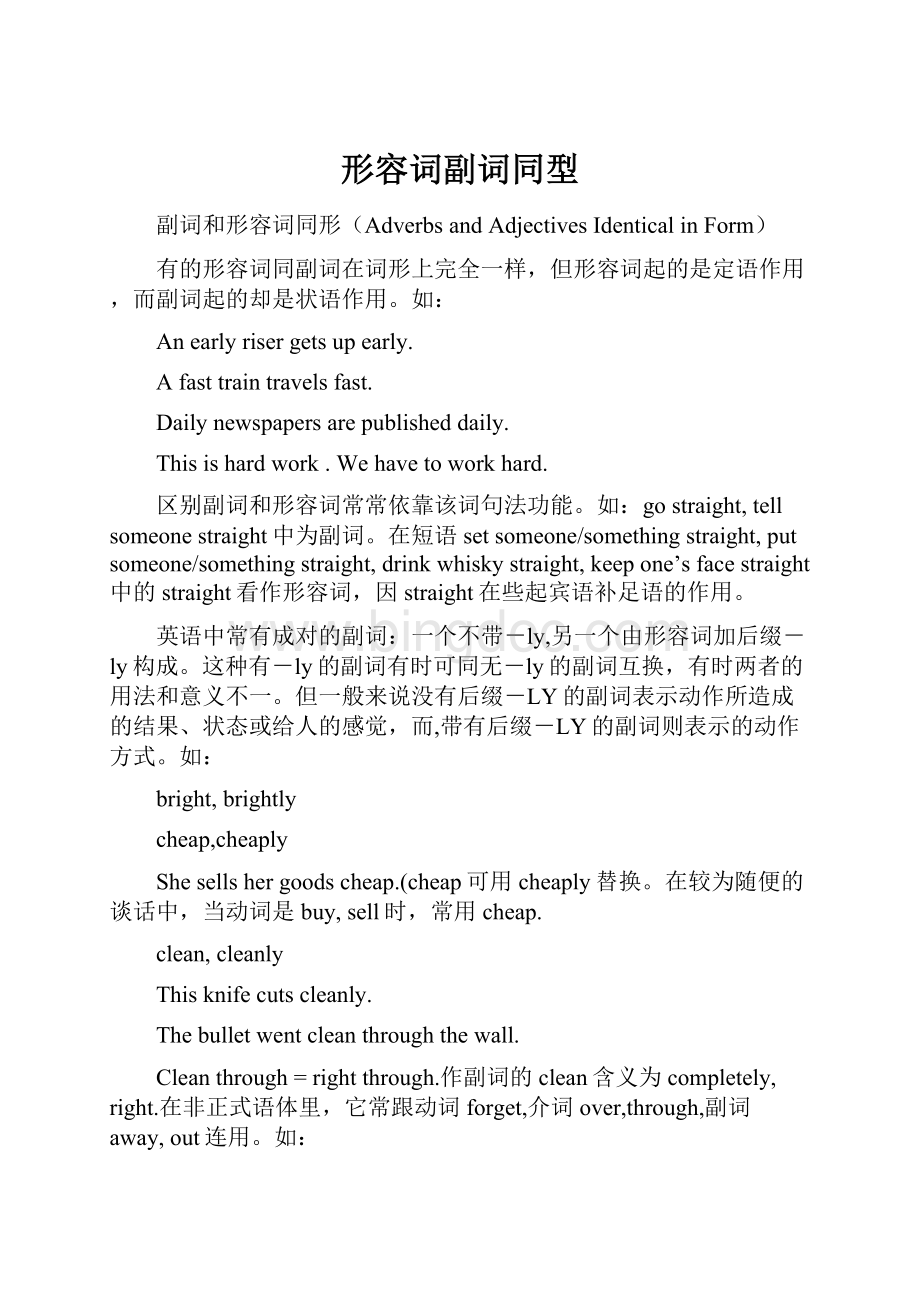形容词副词同型.docx
《形容词副词同型.docx》由会员分享,可在线阅读,更多相关《形容词副词同型.docx(11页珍藏版)》请在冰点文库上搜索。

形容词副词同型
副词和形容词同形(AdverbsandAdjectivesIdenticalinForm)
有的形容词同副词在词形上完全一样,但形容词起的是定语作用,而副词起的却是状语作用。
如:
Anearlyrisergetsupearly.
Afasttraintravelsfast.
Dailynewspapersarepublisheddaily.
Thisishardwork.Wehavetoworkhard.
区别副词和形容词常常依靠该词句法功能。
如:
gostraight,tellsomeonestraight中为副词。
在短语setsomeone/somethingstraight,putsomeone/somethingstraight,drinkwhiskystraight,keepone’sfacestraight中的straight看作形容词,因straight在些起宾语补足语的作用。
英语中常有成对的副词:
一个不带-ly,另一个由形容词加后缀-ly构成。
这种有-ly的副词有时可同无-ly的副词互换,有时两者的用法和意义不一。
但一般来说没有后缀-LY的副词表示动作所造成的结果、状态或给人的感觉,而,带有后缀-LY的副词则表示的动作方式。
如:
bright,brightly
cheap,cheaply
Shesellshergoodscheap.(cheap可用cheaply替换。
在较为随便的谈话中,当动词是buy,sell时,常用cheap.
clean,cleanly
Thisknifecutscleanly.
Thebulletwentcleanthroughthewall.
Cleanthrough=rightthrough.作副词的clean含义为completely,right.在非正式语体里,它常跟动词forget,介词over,through,副词away,out连用。
如:
SorryIdidn’tturnup---ICLEANFORGOT.
Theballsailedcleanovertheroof.
Theprisonergotcleanaway.
I’mafraidI’mcleanoutof(=havenomore)food.
clear,clearly
Standclearofthedoorsofthetrain.
副词clear跟of一起时,意为awayfrom,nottouching.
Hethrewherclearacrosstheroom.
Clearacross=rightacross
“Isaiditveryloudandclear(clear=clearly);Iwentandshoutedinhisear.”
HespokesoclearlythatIcouldheareveryword.
close,closely
Comeclose;Iwanttotellyousomething.(作副词时,“接近地,”“紧密地”,表具体近的程度)
Theboyfollowedclosebehindhisfather.
Thefellowstoodcloseagainstthewall.
副词close是near之意,过去分词前常用closely.如:
Theteacherwascloselyfollowedbyhispupils.
Closely表示一种抽象的概念,“紧密地”“密切地”“严密地”。
WeshouldcloselybeunitedaroundChairmanJiang.
Shecloselyresembleshermother.
Watchhimclosely.(=carefully,withattention)
dead,deadly
Theroadisverydangerous.Godeadslow.(=exactly,completely,slow,可用slowly替换)
还有deaddrunk,deadtired,deadright,deadsure,deadcertain等与deadslow同.
Don’ttouchthat.It’sdeadly.(=adj.;fatal,causingdeath)
It’sdeadlypoisonous.(=very)
Ican’treadthis.It’sdeadlydull.(=very)
Deep,deeply
Deep作副词时,常用来表示具体的深度,“深地”,修饰静止的状态和具体的动作。
而deeply用来修饰情感的动词、形容词和过去分词,表示抽象的概念。
Ourteachersoftenworkdeepintothenight.
Hehadtodigdeeptofindwater.
Weweredeeplymovedbywhathehaddone.
I’mdeeplygratefulforthehelpyougaveme.
direct,directly
Thesenewlawsconcernusalldirectly.(=inadirectway“直接地”)
Let’smeetdirectly(=immediately)afterlunch;thenI‘lltakeyoudirecttoyourroom.(=withoutdeviation,主要用于说及旅行和时间表,指空间、距离,如行程中的不停顿、不绕道,”直接地““不绕(圈)地”)
HeflewdirecttoNewYork.
Hecameandreporteditdirecttome.
Heshouldbetheredirectly.
Shedrovedirectlytoschool.
Shedrovedirecttoschool.
Thenextflightdoesn’tgodirecttoRome,itgoesbywayofParis.
easy,easily
A:
Ican’ttakethistableeasily(=withoutdifficulty).
B:
Yes,butgoeasy(=Don’tberough)withit.It’sanantique.Easy作为副词用在一些固定搭配中。
如:
takeiteasy(=relax);Standeasy!
(amiitarycommand);Easycome,easygo(=Whatwegetwithoutdifficultyisquicklylost).
fair,fairly
I’vemarkedyouressayfairly(=justly,honestly,accordingtotherules),andIcanassureyou(that)it’sfairly(=quite,rather)good.
Hetoldthefactsfairly.
Fair作副词只用在playfair,speakfair,tohitsomethingfairandsquare中。
fine,finely
Thatsuitsmefine.
You’redoingfine.
Fineadv.=well,一般用在口语中;若某东西finelycut或finelychopped,意为cutintoverysmallpieces.
firm,firmly
Ifwestandfirm,(=unyield)Ifirmlybelieveweshallsucceed.
Theguardisstandingfirmattheentrancetothecamp.
Holdthispostfirm(=firmly)whileIhammeritintotheground.
Theboyfirmlycaughtholdoftherope.
有的词典认为standfirm,stayfirm,setfirm,holdfirm中的firm为adj.
free,freely
Youcaneatfree(=withoutpayment)inmyrestaurantwheneveryoulike.
Don’tletthedogrunfree.(=inafreemanner)
Youcanspeakfreely(=withoutlimitationorrestriction)infrontofGeorge---heknowseverything.
hard,hardly
Youhaveworkedhardtoday.(=diligently,strenuously)
You’vehardlyeatenanything.(=almostnot)
high,highly
He’sveryambitious:
heaimshigh.
Throwtheballashighasyoucan.
Canyoujumpthathigh?
Heheldhisheadhigh.
此处high为高度(height)及位置(position)用作副词时,指具体的高度。
Highly指抽象概念的高,常用来修饰形容词的分词和用在一些常见的搭配中。
如:
Heisahighlyskilledworker.
Theheadmasterthinkshighlyofmyteaching.
He’shighlyintelligent,highlytrained.(==toahigdegree;verymuch)
用于比喻意义时常用highly,如:
Theyspeakhighlyofyou.
just,justly
Hewasjustlypunishedforhiscrimes.(=inaccordancewithjusticeorthelaw公正地,正当地).
Thejudgedealedthecasejustly.
Weeachweretreatedjustly.
I’vejustbeenreadingaveryinterestingbook.(=amomentago,exactly,merely)
Dojustasyoulike.(正好)
Heisjustanordinaryman(仅仅).
I’mjustoutofhospital.
Heisjustachild,don’tquarrelwithhim.
late,lately
Everymorningthisweekshehasarrivedlate.(=afterthetimeexpected,晚地,迟地)
Hasshebeenherelately?
(=recently,notlongago,最近,近来,常用在疑问句和否定句中,在肯定句中常用recently.)
Haveyouseenherlately?
Ihearthatyouhaven’tbeenwelllately.
Hearrivedhomeverylatefromworkyesterday.
但二者都可用在aslateas,aslatelyas片语中。
loud,loudly
Don’tspeaksoloud.They’llhearyou.
在非正式语体中常用loud替换loudly,louder替换moreloudly;在动词talk,speak,shout,laugh后,以及在短语loudandclear里也是如此.但介词短语前却只用loudly.如:
Theyshoutedloudlyforhelp.Noonecame.
low,lowly
Tacklehimlow;grabhislegs.
Low是high的反义词,可说flylow,aimlow,speaklow,bowlow.
Heoccupiesalowlyposition.(=adj.,humble.)
most,mostly
Heenjoysacigarettesometimes,butmostlyhesmokesapipe.
Mostly==mainly,adj.
Most==very.:
Ofallthecompetitorsshewastheonewhomostdeservedtowin.
near,nearly
NationalDayisdrawingnear.
Near:
adj&adv.;
Nearly:
adv.almostbutnotquite.
Hewasnearlykilledintheaccident.
Nearly可作修饰语置于不定代词前。
如:
Nearlyeveryonecametothemeeting.
pretty,prettily
Marydancesveryprettily.
Prettily是方式状语,inaprettyway,skilfully,非正式语体中的pretty是副词,修饰形容词或副词,是rather,fairly.如:
She’sprettygood.Shedancesprettywell.
quick,quickly
Thetrainwillgetyoutherequickerthanthebus.
I’llgetbackasquickasIcan.
在非正式口语中,常用quick替换quickly,当动词表示运动以及quick是比较级时,更是用quick而不用quickly.
real,really
Thatwasrealnice.
Youcookrealwell.
上二例中real为adv.,替换了really,在非正式口语、特别在美国英语中,会听到。
Idon’treallylikeher.(==truly)
right,rightly
Youguessedright.
Right用rightly替换,为properly,correctly.Right在非正式语体里用得多,而且只能在动词之后,表达totheright-handside时,只用right而不用rightly,如:
Turnrightatthetrafficlights.
Hewasrightlyblamedfortheaccident.(不能用rightly,因right吸用在动词后。
)
Sharp,sharply
作副词的sharp用说及时间音调,用在一些短语里,如:
Pleasereporttomeatteno’clocksharp.(=punctually)
Youaresingingsharp.(=singonanotethatistoohigh.)
Looksharp==hurryup,watchout,
Pullupsharp==stopsuddenly
说及方向时,可互换,为makeanabruptturn.如:
Theroadturnssharp(ly)totheleft.
Heturnedsharp(ly)around.
当含义为severely时只用sharply.如:
Hewassharplyrebuked.
short,shortly
Stopshort.(=suddenly;cutshort==interrupt).
Shortly,adv.只用在这样的短语中:
Hewillbebackshortly.(=soon)
Heexplainedhismeaningshortlybutclearly(briefly).
Heansweredshortlythathedidn’tcarewhatIthought.(==impatiently).
slow,slowly
Goslow.
Goslower.
在非正式口语中,slow替换slowly,slower替换moreslowly,常与动词go,drive等连用。
在道路标志上了常用副词slow,如Slow!
Driveslow!
等,其余场合都用slowly.如:
Whenyouspeakslowly,Iunderstandyou.
sure,surely
Itsureisacoldnight.
Areyouleavingwithus?
–Sure!
此二sure代替了surely,为典型的美国英语。
Hemustsurelysucceed.属英国英语。
tight,tightly
We’rejuststarting.Holdtight.
Sittight.Holdontoyourseatstightly.
此二例的tight,tightly皆为副词,在非正式语体里,不及我动词后不用tight替换tightly;在其它情况下,譬如及物动词加宾语后,就用tightly.
wide,widely
Heopenedthecupboardwide.(表示实际的距离,“宽广地”,“广大地”)
Itwaswideopen.(表示一种程度,一抽象概念,“广泛地”“大大地”。
)
Thewindowwaswideopen.
Hewaswideawake.
Theoldministeropenedhiseyeswide.
Englishiswidelyusedintheworld.
Footballiswidelyplayedalloverthecountry.
Thiscomputeriswidelydifferentfromthatoneinquality.
跟形容词同形的wide是副词,意为widely.
Hehastravelledwidely.(=inmanydifferentplaces.)
wrong,wrongly
Youguesswrong.(=wrongly,为非正式英语,一般置于动词后。
Iwronglybelievedthatyouwantedtohelpme.
Wrongly位于动词前。
大致分为三类:
(一)本类词有hard,hardly;late,lately;most,mostly等。
两种副词形式含义完全不同,使用时不易引起混淆。
(二)本类词主要有wide,widely;close,closely;high,highly等,两种副词形式不同,含义也有差别,但没有第一类的区别明显,且翻译成汉语时也很接近。
使用时容易混淆。
其含义及用法上的主要特点是:
不带-ly的副词表示具体的行为和动作,说明的动作或状况有可测量性和可见性;而以-ly结尾的同源副词所表达的常常是抽象性的行为和状况。
大都具有“greatly”或“extremely”的含义。
(三)这类词主要有slow,slowly;quick,quickly等异形同义词。
当然,现代英语的语言规范性要求用以-ly结尾的副词来修饰动词,但由于句子结构以及搭配的不同,使用时也具有不同的倾向性。
在此,探讨一下在什么情况下使用不带-ly的副词形式。
总的说来,倾向于使用不带-ly副词形式的情况大致有四种:
1、用作比较级或最高级时:
Allenwaswalkingquickly,butGeorgewaswalkingevenquicker.
Themenwerequarrellingloudly,butthepolicemenshoutedlouder.
Thecarwentslowerandsloweruntilitcametoastandstill.
Let’sseewhocanrunquickest.
Wemustlookcloserattheproblem.
2、有“so”或“too”修饰时:
ItallhappenedsoquickthatIcoulddonothing.
Itisimpossibletoovertakehim;yourcargoestooslow.
Don’ttalksoloud;thechildisinbednow.
3、用于修饰表示移动、天气等常用动词时:
Comequick;wearewaitingforyou.
Driveslow;thispartoftheroadisdangerous.
Thesunshinesbright.
Whenwelefttheshelter,thesnowwasfallingthickandthewindwasblowingcold.
Businessisgoingstrong.
4、在固定词组中或当用于修饰它经常固定搭配的动词时:
Takeiteasy.
Standfirmandholdittight.站稳抓牢
Heoftenplayshigh.赌注常下得很大
Thesecretarycopiedtheroughdraftofhermanageroutfair.
Theyweredrinkingdeepintothenight.